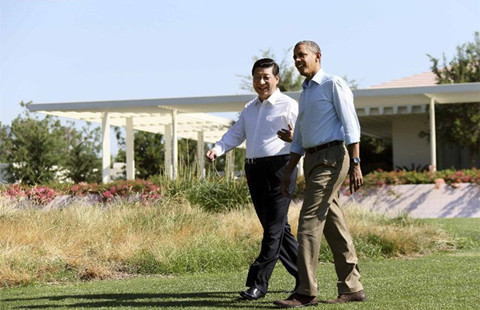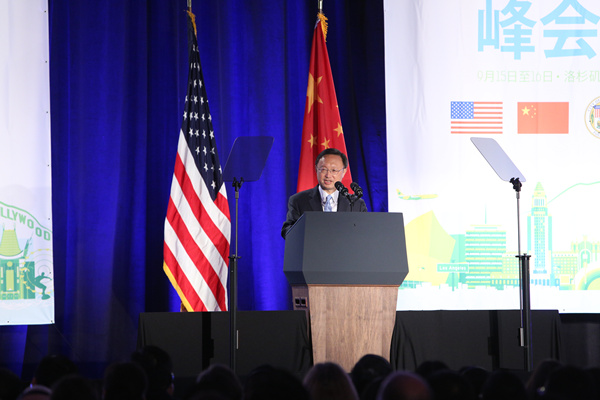China, US businesses agree on roles in carbon reduction at climate summit
Updated: 2015-09-17 11:36
By Lia Zhu and Chang Jun in Los Angeles(China Daily USA)
|
|||||||||
|
Chinese State Councilor Yang Jiechi addresses the first US-China Climate Leaders Summit in Los Angeles on Wednesday. Provided to China Daily |
Chinese State Councilor Yang Jiechi addresses the closing ceremony of the first US-China Climate Leaders Summit in Los Angeles on Wednesday.
Yang said participants from both sides have exchanged ideas, and significant outcomes were achieved during the two-day summit. President Xi Jinping's state visit to the US carries great significance and is believed to serve as a new impetus for the China-US relationship, expanding bilateral cooperation and deepening the friendship between the two nations' peoples, said the state councilor.
Business leaders from China and the United States gathered Wednesday in Los Angeles to discuss their roles in fighting climate change and the opportunities for driving green, low-carbon development.
"Frequently, environmental objectives can be seen as incompatible with economic growth. We believe it is possible to meet both environmental objectives and have economic prosperity," Theodore F Craver Jr, CEO of Edison International, told a business leaders roundtable meeting during the first US-China Low-Carbon and Smart Cities Summit, also known as US-China Climate Leaders Summit.
Innovation, ingenuity, private capital and well-functioning markets make it possible to meet both objectives, he said, adding that it is the company's responsibility to devise solutions to create a low-carbon and prosperous economy.
Craver's remarks were echoed by Li Chunguang, director president of Sinopec Corp, who said his company has realized significant reduction in carbon emissions while keeping the production steadily expanded.
"In 2013, we launched an environmental protection drive and set the goal of investing $3.8 billion in low-carbon programs," he said.
"So far, we have invested $2.5 and have largely maintained clean production."
"The US and China are the two largest economies and also the two largest carbon producers, which means we have the power to shape the future of our planet," said Elizabeth Sherwood-Randall, deputy energy secretary,
She said business-to-business collaboration is as important as government dialogue, as it can produce the technologies, business models and policies to fulfill the climate commitments.
In stressing the role of businesses, Su Wei, director general of the Department of Climate Change of China's National Development and Reform Commission, called on the companies from both sides to incorporate climate-change issues in their operations and marketing practices.
Cities are responsible for 70 percent of CO2 emissions, and 90 percent of the world's urban areas sit on coastal lines, which makes them more vulnerable to climate change.
"Making our cities smarter means to equip them with the tools that they need to address the pressing problems their citizens care the most about, such as traffic congestion, sustainability and delivery of the city's services," said Randall. "Private industries will do much of the heavy lifting to take clean energy technologies to market."
Tacking climate change takes the whole world's efforts, said Guo Yong, chairman of Sichuan Energy Industry Investment Group Co Ltd. "I hope China and the US, along with advanced countries can set up a low-carbon alliance, promoting new energy technologies without barriers."
In China, a similar alliance focused on energy efficiency and emissions reduction is underway with the efforts of some companies and universities, according to Guo.
The services and products for low-carbon, green technologies is expected to be the largest market in the future, said Gene Sykes, co-head of Global Mergers and Acquisitions and co-chair of the global technology, Media and Telecom Group. "There will be ups and downs and I won't be surprised when it happens. But the trend line will be up," he said.
"China and the US also are two of the world's largest producers of clean energy. Together we can show that finding solutions, driving down costs and deploying technologies at scale can also drive jobs and growth in our economies," Randall said.
- UN chief: Those blocking fleeing refugees should 'stand in their shoes'
- Hungarian riot police detain migrants
- IOC announces five cities bid for 2024 summer Olympic
- Japan opposition to halt vote on security bills
- Japan protesters rally as security bills near passage
- Australia launches first air strikes against IS

 Popular Chinese dishes in the US
Popular Chinese dishes in the US
 Evacuation ordered after M8.3 earthquake hits Chile’s coast
Evacuation ordered after M8.3 earthquake hits Chile’s coast
 Donate sperm to get an iPhone 6s
Donate sperm to get an iPhone 6s
 NYFW: Anna Sui Spring/Summer 2016 collection
NYFW: Anna Sui Spring/Summer 2016 collection
 Five unorthodox majors that could create a successful business
Five unorthodox majors that could create a successful business
 Four major meetings between Xi and Obama since 2013
Four major meetings between Xi and Obama since 2013
 Ice cube bath sets world record
Ice cube bath sets world record
 Chinese noncommercial ads to be displayed in the US
Chinese noncommercial ads to be displayed in the US
Most Viewed
Editor's Picks

|

|

|

|

|

|
Today's Top News
Xi to press case for Bilateral Investment Treaty
Australian dad takes on Chinese drug dealers after son’s death
Senior official at securities watchdog under investigation
Sequel of Crouching Tiger's underway but without Ang Lee
Action on climate heats up in LA
Fire traps more than 100 kids in East China building block
President Xi to visit US and attend UN summit in late September
2015 US-China Climate Leaders Summit kicks off
US Weekly

|

|









